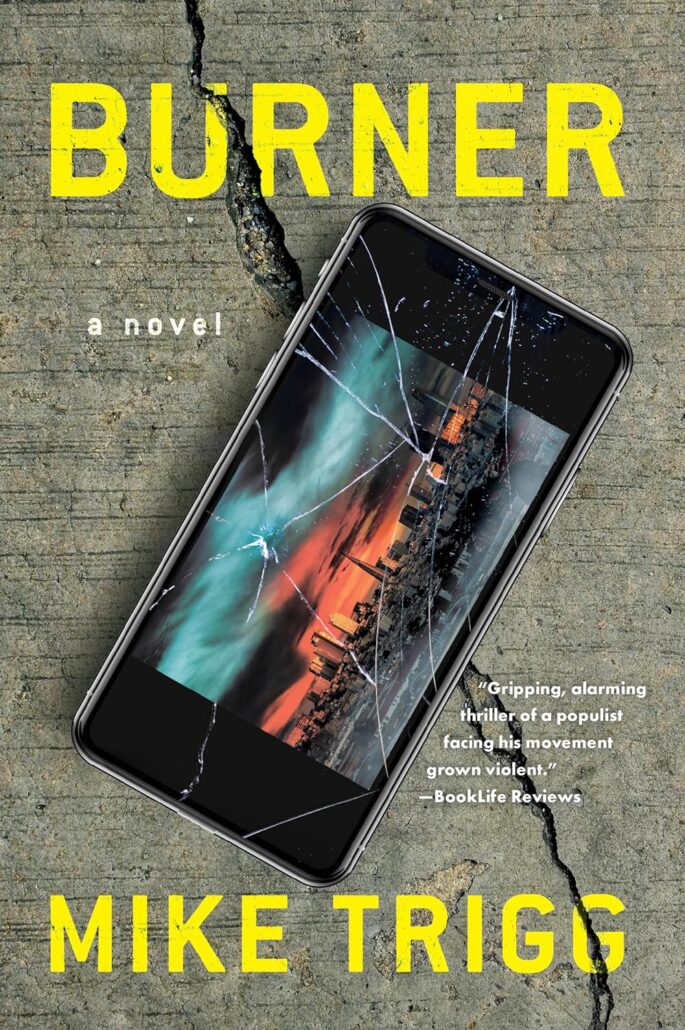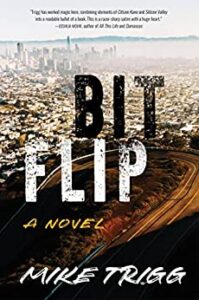Burner received a 4+ star review, making it an IndieReader Approved title.
Following find an interview with author Mike Trigg.
What is the name of the book and when was it published?
Title: Burner Publish date: April 16, 2024.
What’s the book’s first line?
“I’m not sure yet if this is a memoir or a manifesto, a love letter or a suicide note.”
What’s the book about? Give us the “pitch”.
Burner tells the story of Shane, the anonymous leader, known only as Burner_911, of an online populist movement, and Chloe, the progressive celebrity daughter of a tech billionaire. When the movement spirals out of control with a riot on the streets of San Francisco, Shane is arrested for domestic terrorism just as Chloe is abducted by his followers. From prison, Shane tries desperately to save Chloe from the forces he has unleashed, while Chloe, from her own captivity, becomes more sympathetic to Burner_911’s cause and devises a plan to free herself. Fundamentally, the story is a cautionary tale of the societal and personal consequences of our technology-obsessed culture, demonstrating the lost sense of identity, trust, and truth itself that characterizes contemporary life.
What inspired you to write the book? A particular person? An event?
I previously worked both on Capitol Hill and in Silicon Valley, so I’ve always been interested in the intersection of politics and technology. Over the last decade, we’ve all witnessed disturbing ways that online platforms have been exploited to spread disinformation, exacerbate political polarization, and even inspire acts of violence. For me, the orchestrated riot of January 6, 2021 showed just how dangerous those forces can be and inspired me to write a story that examines the underlying dynamics behind an incident like that.
What’s the main reason someone should really read this book?
We are hurtling into another national election, but we have not yet really grappled with the ways social media, disinformation campaigns, unmoderated dark web communities, deepfakes, generative AI, and other technologies are corroding our democracy. This book delves head-first into the tough issues around freedom of speech, social stratification, and unfettered public manipulation that we need to understand and counteract.
What’s the most distinctive thing about the main character? Who-real or fictional-would you say the character reminds you of?
I’m definitely a fan of flawed protagonists and Shane Stoller, along with his anonymous alter ego Burner_911, is definitely flawed. As we learn more of Shane’s back story, growing up orphaned, poor, and forgotten in California’s Central Valley, we start to understand why. The most distinctive thing about Shane is he’s an online savant—finding the agency, power, and affluence in his digital persona that he lacks in real life. But, ultimately, his ego gets the better of him, pushing everything too far with tragic unintended consequences. Probably the fictional character Shane most reminds me of is Tyler Durden, the compelling split-personality protagonist in Chuck Palahniuk’s brilliant novel Fight Club, which was also adapted to film. Both are tragic, self-destructive characters fighting against the oppression they perceive from society at-large.
When did you first decide to become an author?
In an undergrad creative writing course, but I chickened out! I didn’t want to be a starving author, so I pursued “writing adjacent” occupations, first in public relations, then marketing more broadly, and ultimately in the tech industry. But I always wanted to write a novel, and started doing so, drawing inspiration from my career in tech. I was about a hundred pages into my first novel, writing nights and weekends and not making much progress, when the pandemic hit and the start-up I was working on got shut down. The silver lining for me was it afforded me the chance to jump into novel writing full time, and I’ve been doing that since.
Burner is my second novel. My first, titled Bit Flip, came out in August of 2022, also with SparkPress. It’s a corporate thriller based on an executive who inadvertently discovers possible fraud at his start-up company. It’s also a cultural critique of some of the bad behaviors and excesses of Silicon Valley.
What do you do for work when you’re not writing?
I don’t have a full-time occupation, but I am still involved in the tech industry as an informal advisor and micro investor, mostly in early-stage enterprise software.
How much time do you generally spend on your writing?
It’s really hard to quantify, and I’m sure if I added up all the hours from concept to publication I’d be alarmed how many hours go into producing a book! When I’m writing a first draft, I set daily goals, usually about four hours per day, that I’m pretty good at meeting. The editing process is harder to measure since you can’t just go by word count, so that tends to happen more in bursts for me as I push to hit my deadlines.
What’s the best and the hardest part of being an indie?
The best part is definitely the creative flexibility. Both my novels captured exactly what I wanted to say without being contorted too much by commercial considerations. But the challenge for indie authors and publishers is discovery. With so many books getting published every year, it’s hard to stand out.
What’s a great piece of advice that you can share with fellow indie authors?
Enjoy the process. It’s easy to get fixated by sales figures, literary awards, and bestseller lists. But only a microscopic percentage of books ever achieve enviable metrics. So you truly have to love the process of writing, have to derive pure enjoyment from creating something out of nothing. Writing needs to be your favorite hobby, the thing you’d do with your free time regardless if you sold a single copy.
Would you go traditional if a publisher came calling? If so, why?
Yes, but not for the usual reasons. A lot of self-published and indie-published authors assume a traditional publishing deal means automatic success. The reality is most books even from Big Five publishers have very limited sales. In the recent Penguin Random House/Simon & Schuster antitrust trial, it was revealed that half the books published by traditional publishers sell fewer than one dozen copies and 90 percent sell fewer than 2,000 copies. So even traditionally published authors really need to build their own career and promote their own work. But the area where traditional publishing still has an advantage is in discoverability. Fair or not, you just have a much better chance of getting literary reviews, bookstore distribution, media coverage, etc. with a traditional publisher.
Is there something in particular that motivates you (fame? fortune?)
Fame and fortune are bad reasons to become an author, since so few authors achieve that. What motivates me is impacting the conversation. I try to write novels that really make the reader think about issues in contemporary culture, particularly the impact of technology on our lives. I really enjoy discussing those issues with readers, journalists, podcasters, and other audiences.


